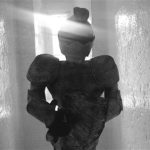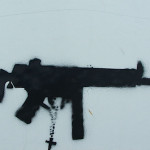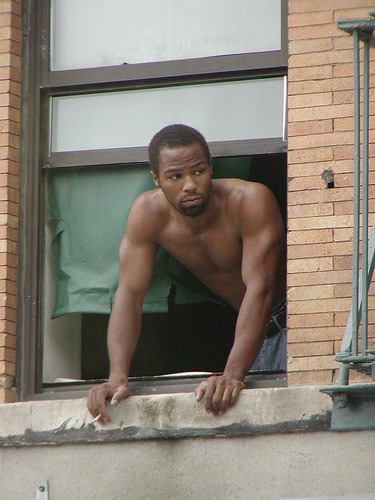We run our website the way we wished the whole internet worked: we provide high quality original content with no ads. We are funded solely by your direct support. Please consider supporting this project.
Poor and Black in America
Drew Hart is someone with a rare voice. I’m sharing the bio from his blog in its entirety because I think knowing some of his story gives authority to his words.
Drew Hart has been shaped by both Black Church theology and Anabaptist theology. Drew was raised in an African American Church but was introduced to Anabaptism first while studying at Messiah College as a Biblical Studies major. After completing his undergrad, Drew joined the pastoral team of Harrisburg BIC Church, a racially diverse and urban Anabaptist community committed to racial reconciliation in the city for 4 years. After, Drew came back to Philly, to work on his MDiv at Biblical Seminary. Right now, Drew, along with continuing pastoral ministry, is also a PhD student at Lutheran Theological Seminary at Philadelphia in Theology & Ethics. His research is focused on the intersection of African American theology and Anabaptism, but particularly he is focused on how Jesus has been salvaged and reunderstood by these 2 communities that have been oppressed and persecuted at the hands of Western Christian majorities. Drew believes that together the two traditions can contribute immensely in decolonizing American theology and that they are more faithful to the life and teachings of Jesus. Drew regularly speaks at churches and conferences, confronting racism, oppression, and violence, while continually pleading with Christians to take a stand. Drew has been married since 2008 to Renee (whom he met at the Harrisburg BIC church). They have two young sons, Micah and Dietrich. They have been living in the East Germantown section of Philly since 2008.
Drew shared his thoughts this week on attitudes towards black people living in poverty in America. Please take the time to read the entire blog post. It’s so important for us as kingdom people to recognize the insidious assumptions we hold and the ways those assumptions and attitudes contribute to the pain and burden of the most vulnerable in our society.
A peek into Drew’s post:
When I was growing up my family scraped by with the bare necessities but there was never a short supply of love. By High School, my family had clearly crossed over firmly into the black middle class. We moved to the burbs and I attended a middle class suburban high school from grades 10-12. Since college, I have been living in black neighborhoods (1st in Harrisburg, PA, then in Philly) comprised of mostly poor and working class families. However, my own family is most certainly middle class. Everyday I live with the realities that come with being a young black male. The fear, the stereotypes, the clutched purses, and the always present and perpetual threat of being suspected for the crime of being black at the wrong time or place, that is when cops are looking for any black body to fit their description. Being black is draining. Blackness still continues to be described pejoratively in America. To be a black american is to constantly have to tell yourself that you are somebody, that you are made in the image of God, that you are creative, and intelligent. To not do so will result in being drowned in the negative words that dominant culture has to say about your existence and ‘your kind’.
Yet, I don’t even have to deal with where my next meal is coming from, or the stigma of not having a college degree while searching for a job (God forbid you have a conviction, because there are almost no options for you when you are black). I have healthcare, food, housing, transportation, and a reliable and livable income. And in a couple years I will have a PhD, which will make me extremely privileged educationally speaking, within the black community. Blackness by itself is tiring enough, but to be poor and black is a burden I honestly can only sympathize with at this point (rather than empathize with) as my neighbors share with me their struggles to find work and provide for their family. And yet, it is precisely poor black families that are often the most popular targets of the media and the middle class. Through vitriol and stereotype, they get blasted 24/7 for every aspect of their lives. They are the scapegoats of America, who will champion them?
Related Reading

Guante: Starfish
http://youtu.be/oYkoVFfYdC0 Guante is a Minneapolis-based spoken-word artist. His piece here is called Starfish and it speaks to the tension between working for small changes and dreaming of a better world where much bigger changes are needed. Amen. (Special Thanks to Rod Thomas for reminding me how great Guante can be.)

Put on the Armor of God
The whole of the Christian life is an act of war against the enemy as we follow Jesus in storming the gates of hell (See post.) No passage better illustrates this than Paul’s metaphor of spiritual armor from Ephesians 6. He writes that Christians are to “be strong in the Lord and in the strength…

A Lesson in Otherness
http://youtu.be/VeK759FF84s Long, long ago, a third grade teacher taught her class a lesson they will never forget. You won’t forget it either. This video is nearly 15 minutes long, but it’s so worth your time. Let’s love one another.

The Only Thing That Matters Is Love: The Kingdom of God (Part 3)
To say that living in Calvary-quality love is the most important thing in our life is to grossly understate its importance. This stands in distinction from how we typically define the Kingdom of God. But it stands in line with the fact that Jesus is the Kingdom of God. Paul says the “the only thing…

Does the Old Testament Justify “Just War”?
Since the time of Augustine, Christians have consistently appealed to the violent strand of the Old Testament to justify waging wars when they believed their cause was “just.” (This is Augustine’s famous “just war” theory.) Two things may be said about this. First, the appeal to the OT to justify Christians fighting in “just” wars…

Contemplating Food Choices
As many of you know, Shelley and I have been vegetarians for the last eight years or so. This is a personal conviction, not a doctrine, but there are compelling reasons for adopting this lifestyle. The main conviction that led me to quit eating meat was that I felt I should never kill anything out of convenience…

